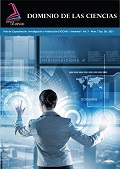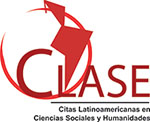Educación virtual en pandemia: una perspectiva de enseñanza actual en el personal de salud
DOI:
https://doi.org/10.23857/dc.v7i4.2424Palabras clave:
educación virtual, pandemia, hermenéutica, contingencia, desigualdad tecnológica.Resumen
El siguiente artículo, es producto del anólisis a la realidad educativa tras ponerse en próctica la educación virtual en el personal de salud en el tiempo de pandemia. Se considera la hermenéutica como elemento primordial para interpretar desde las experiencias propias lo vivido como docente de esta sociedad. El surgimiento de la pandemiaCOVID-19 alteró drósticamente todos los aspectos de la vida humana, especialmente la educación. A pesar de esta contingencia, las instituciones educativas reaccionaron positivamente asegurando la continuidad escolar. Sin embargo, este ómbito necesita políticas píºblicas fortalecidas, ya que esta pandemia expuso las graves consecuencias del debilitamiento de este importante sector. Esta crisis sanitaria debe implicar un aumento de la inversión y desarrollar la reconversión técnica que tanto se necesita para minimizar la desigualdad tecnológica y permitir que el proceso educativo sea eficaz. El momento vivido nos permite reflexionar sobre lo crítico de la situación y nos recuerda cuón crucial es la educación píºblica en la sociedad para luchar contra las diferencias y la construcción democrótica de un futuro comíºn.Citas
Adnan, M., Kainat, A. (2020). Online learning amid the COVID-19 pandemic: Students' perspectives. Journal of Pedagogical Sociology and Psychology, 2(1), 45-51. http://www.doi.org/10.33902/JPSP.%202020261309
Basilaia, G., Kvavadze, D. (2020). Transition to online education in schools during a SARS-CoV-2 coronavirus (Covid-19) pandemic in Georgia. Pedagogical Research, 5(4), 1-9. https://doi.org/10.29333/pr/7937
Cucinotta, D., Vanelli, M. (2020). WHO declares COVID-19 a pandemic. Acta Bio-Medica: Atenei Parmensis, 91(1), 157-160. https://doi.org/10.23750/abm.v91i1.9397
Crawford, J., Butler, K., Rudolph, J., Glowatz, M. (2020). COVID-19: 20 countries' higher education intra-period digital pedagogy responses. Journal of Applied Teaching and Learning, 3(1). . http://dx.doi.org/10.37074/jalt.2020.3.1.7
Elacqua G., Schady N. (2020). La educación ante el Covid-19 en Amí©rica Latina: Retos y alternativas de política.https://blogs.iadb.org/educacion/es/retosyalternativasdepoliticaeducativa/
Kaur, G. (2020). Digital Life: Boon or bane in teaching sector on COVID-19. CLIO an Annual Interdisciplinary Journal of History, 6(6), 416-427.
Khati, K., Bhatta, K. (2020). Challenges of Online Education during COVID-19 Pandemic in Nepal. International Journal of Entrepreneurship and Economic Issues, 4(1), 45-49. http://journals.kingscollege.edu.np/index.php/ijeei/article/download/45/18
Kumar P. (2020). Impact of Covid-19 on higher education in India. International Journal of Advanced Education and Research. 5(3): 77-81. https://osf.io/preprints/socarxiv/jg8fr/download
Mailizar, A., Maulina, A., Bruce, S. (2020). Secondary school mathematics teachers’ views on e-learning implementation barriers during the Covid-19 pandemic: The case of Indonesia. Eurasia Journal of Mathematics, Science and Technology Education, 16(7), em1860. https://doi.org/10.29333/ejmste/8240
Malhotra, S., Kumar, A. (2013). Role of online education in modern education system.International Journal of Research in Management & IT. 1(1), 6-20. https://www.researchgate.net/publication/338829743_Role_of_Online_Education_in_Modern_Education_System
Ministry of Education, Science, Culture and Sport of Georgia. (2020). Ministry of Education, Science, Culture and Sport of Georgia to strengthen distance learning methods. https://www.mes.gov.ge/content.php?id=10271&lang=eng
Morín, E. (1999). Los siete saberes necesarios para la educación del futuro. Paidós: Barcelona.
Murphy M. (2020). COVID-19 and emergency eLearning: Consequences of the securitization of higher education for post-pandemic pedagogy.Contemporary Security Policy, 41(3), 492-505. . http://dx.doi.org/10.1080/13523260.2020.1761749
Murillo, F., Duk, C. (2020). El Covid-19 y las Brechas Educativas. Revista latinoamericana de educación inclusiva, 14(1), 11-13. https://dx.doi.org/10.4067/S0718-73782020000100011
Organización Mundial de la Salud (OMS). (2020). WHO Director-General’s opening remarks at the media briefing on COVID-19, 11 March 2020. Geneva, Switzerland.
Peters, M., Wang, H., Ogunniran, M. (2020). China’s Internationalized Higher Education During Covid-19: Collective Student Autoethnography. Postdigital Science Education, 2, 968-988. https://doi.org/10.1007/s42438-020-00128-1
Rodríguez, M. (2017a). Fundamentos epistemológicos de la relación patrimonio cultural, identidad y ciudadanía: hacia una Educación Patrimonial Transcompleja en la ciudad (Tesisiní©dita de Doctorado). Universidad Latinoamericana y el Caribe. Caracas, Venezuela.
Rodríguez, M. (2020b). La hermení©utica comprensiva, ecosófica y diatópica. Un transmí©todo rizomático en la transmodernidad. Perspectivas metodológicas, 19, 1-15.
Rodríguez, M., Peleteiro, I. (2020). Antropolítica en Venezuela: un cuenco de mendigo, más aíºn en tiempos de pandemia 2020. SUMMA. Revista disciplinaria en ciencias económicas y sociales, 2(Especial), 117-139. https://dx.doi.org /10.47666/summa.2.esp.09
Sánchez, L., Alvarenga, S. (2015). La virtualidad en los procesos educativos: reflexiones teóricas sobre su implementación. Tecnología en Marcha, 28(1), 121-129. https://doi.org/10.18845/tm.v28i1.2196
Sintema, E. (2020). Effect of COVID-19 on the Performance of Grade 12 Students: Implications for STEM Education. Eurasia Journal of Mathematics, Science and Technology Education, 16(7), em1851. https://dx.doi.org /10.29333/ejmste/7893
Toquero, C. (2020). Challenges and Opportunities for Higher Education amid the COVID-19 Pandemic: The Philippine Context. Pedagogical Research, 5(4), em0063. https://dx.doi.org /10.29333/pr/7947
UNESCO (2020). Global Monitoring of School Closures caused by COVID-19.https://en.unesco.org/covid19/educationresponse
Weeden, K., Cornwell, B. (2020). The small world network of college classes: Implications for epidemic spread on a university campus.
Publicado
Cómo citar
Número
Sección
Licencia
Authors retain copyright and guarantee the Journal the right to be the first publication of the work. These are covered by a Creative Commons (CC BY-NC-ND 4.0) license that allows others to share the work with an acknowledgment of the work authorship and the initial publication in this journal.







